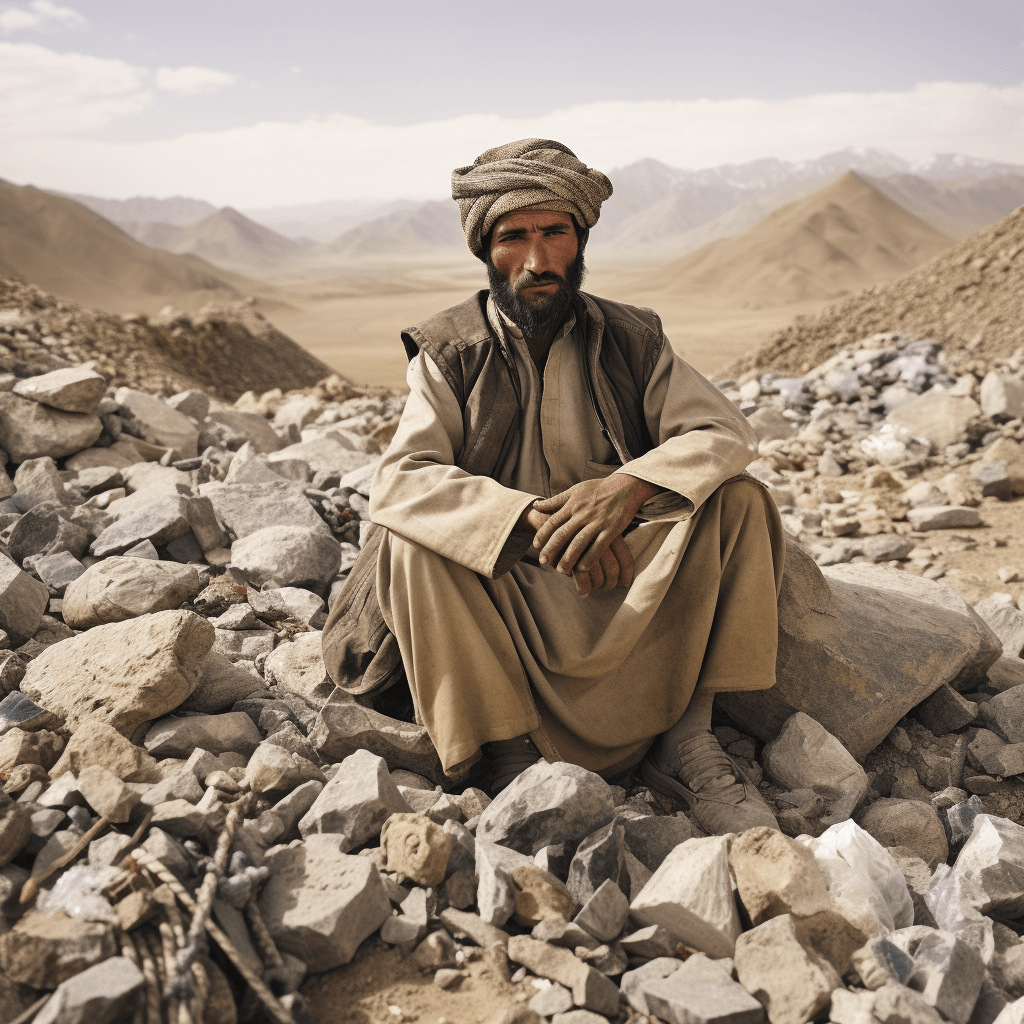
Afghanistan’s Lithium: A Geopolitical Game Changer?
Share
Afghanistan, often dubbed the “Saudi Arabia of lithium,” is home to vast and untapped lithium reserves, a metal pivotal for the production of batteries that power electric vehicles, laptops, and smartphones, increasingly integral to our modern life. Lithium's significance cannot be overstated in an era fervently pushing towards greener, sustainable energy solutions, given its crucial role in energy storage technology. The burgeoning demand for lithium inevitably turns the spotlight on Afghanistan, a country ensnared in turmoil but immensely rich in this sought-after metal.
Historically, the contest for valuable resources has invariably led to intensified geopolitical engagements and, at times, conflicts. Afghanistan’s lithium reserves are no exception, making the country a focal point of international interest and competition. In this scenario, China, with its voracious appetite for resources to fuel its burgeoning economy and its established prowess in the lithium-ion battery market, emerges as a key player.
China’s interest in Afghanistan’s lithium is steeped in multifaceted strategic, economic, and geopolitical considerations. It positions China in the broader context of global power dynamics, examining its pursuit for resources in tandem with its overarching geopolitical strategies and economic ambitions. With the ongoing global energy transition and the unprecedented emphasis on renewable energy sources, the quest for lithium reserves is intensifying, and the stakes are becoming increasingly higher.
China, renowned for its strategic long-term planning, perceives Afghanistan's lithium reserves as a golden opportunity to consolidate its influence and secure its position in the global lithium supply chain. This burgeoning interest is not isolated but intricately linked with China’s multifarious global ambitions, specifically its Belt and Road Initiative, aimed at enhancing connectivity and cooperation, and thus influence, across the globe.

Afghanistan's Lithium Reserves: A Closer Look
Afghanistan's vast lithium reserves, possibly amounting to millions of tons, have positioned it as a key contender in the global lithium market. This wealth lies beneath its rugged terrains, a silent spectator to the decades of conflict and instability that have beleaguered the nation. The existence of these reserves was brought to light by the United States Geological Survey (USGS) in the early 21st century, unveiling a wealth that could potentially transform Afghanistan's economic landscape.
Quantitative Analysis: The Extent of the Reserves
Estimates of Afghanistan's lithium reserves are extensive, with the USGS highlighting the country's potential to be among the largest global holders of lithium. The precise quantification is still a subject of ongoing research and exploration, making it a focal point of intrigue and speculation in international discourse. However, even the most conservative estimates place Afghanistan’s lithium wealth significantly high, underscoring its potential impact on the global lithium supply chain.
Geographic Distribution
The lithium reserves in Afghanistan are primarily located in the regions of Ghazni and Herat. These areas, rich in geological diversity, host a multitude of minerals, among which lithium stands out due to its escalating global demand. The geographic distribution of these reserves adds another layer to the geopolitical complexity, considering the intricate web of regional interests, security concerns, and developmental needs that intersect within these territories.
The Economic Importance to Afghanistan
The economic implications of exploiting these lithium reserves for Afghanistan are monumental. It offers a beacon of hope to a nation grappling with economic hardships and political instability. The revenues generated from lithium can be instrumental in bolstering Afghanistan's economy, fostering development, and alleviating poverty. However, realizing this potential is fraught with myriad challenges, including security concerns, infrastructural deficiencies, and the need for sustainable, equitable resource management policies.
China's Geopolitical and Economic Interests
China’s intentions in Afghanistan’s lithium reserves are meticulously intertwined with its overarching geopolitical strategies and economic aspirations. The potential acquisition of these reserves is not merely a pursuit of resources; it is emblematic of China’s expansive vision, strategic foresight, and desire to fortify its influence on the global stage.
China’s Previous Engagements in Extractive Industries
China's pursuits in Afghanistan are informed by its history of engagements in extractive industries globally. China has notably marked its presence in Africa and Latin America, investing extensively in mining projects, seeking to secure steady supplies of crucial minerals. This strategic endeavor allows China to fuel its burgeoning economy and bolster its manufacturing capabilities, particularly in sectors pivotal for the future, such as green technologies and renewable energy.
The Belt and Road Initiative: Strategic Importance
Afghanistan’s lithium reserves are strategically aligned with China’s ambitious Belt and Road Initiative (BRI), aimed at fortifying international trade routes and amplifying China’s global influence. By integrating Afghanistan into this grand project, China aspires to enhance regional connectivity and cooperation, fostering economic synergies that further consolidate its geopolitical footprint. The BRI, in this context, emerges as a conduit for China to navigate and shape the geopolitical landscape, leveraging economic collaborations to build alliances and assert its influence.
China's Evolving Relationship with Afghanistan
China's relationship with Afghanistan has been dynamic, marked by a cautious approach yet underlined by a persistent interest. The evolving geopolitical scenarios have spurred China to recalibrate its strategies, balancing its security concerns with its desire to establish a robust presence in Afghanistan. The potential lithium ventures serve as a catalyst for this evolving relationship, enabling China to intertwine its economic interests with its diplomatic engagements, thus fostering a multifaceted partnership with Afghanistan.

International Implications and Stakeholders
The entwining of interests in Afghanistan’s lithium reserves ushers in a plethora of international implications, reshaping relationships and recalibrating global power dynamics. The various stakeholders, each with their distinct motivations and strategies, bring forth a multilayered complexity to the unfolding narrative.
The Role of Other Countries: The United States and Russia
The United States and Russia, each with historical engagements in Afghanistan, are crucial actors in this scenario. The U.S., having invested extensive resources in Afghanistan, perceives the evolving situation with a blend of strategic caution and economic interest. The potential ascendancy of China in Afghanistan’s lithium market has implications for U.S. economic and geopolitical interests, necessitating a reevaluation of strategies and engagements.
Russia, with its proximity to Afghanistan and historical involvement in the region, monitors the developments with vested interests. The potential influence of China in the region provokes reflections on regional security, economic collaborations, and the evolving balance of power.
The Impact on Global Lithium Markets
China’s potential acquisition of Afghanistan's lithium reserves could significantly impact global lithium markets. With China already a dominant player in the lithium-ion battery market, securing a steady supply of lithium could further consolidate its position, influencing pricing, supply chains, and market dynamics. This development could prompt responses from other lithium-producing countries and companies, potentially instigating innovations, partnerships, and strategic alliances aimed at maintaining competitiveness in the evolving market landscape.
Potential Influence on International Relations
The quest for Afghanistan’s lithium intertwines with broader international relations, influencing alliances, collaborations, and diplomatic engagements. The varying interests and strategies of different countries could give rise to new partnerships and recalibrated alliances, each aiming to navigate the shifting sands of geopolitical and economic landscapes. The dynamics unfolding in Afghanistan serve as a microcosm of the broader transformations in international relations, reflective of the changing global order and the multifaceted interplay of power, resources, and influence.
The Role of Lithium in the Global Economy
Lithium stands at the crossroads of technological advancement and environmental sustainability, its significance bolstered by the global pivot towards green energy solutions. The role of lithium in the global economy is multifaceted, extending beyond its utility to embody its impact on market dynamics, technological innovations, and environmental aspirations.
The Rising Demand for Lithium: An Overview
The global appetite for lithium is on an upward trajectory, propelled by the burgeoning demand for electric vehicles, renewable energy storage solutions, and portable electronic devices. The International Energy Agency predicts that by 2030, the global electric vehicle fleet will surpass 125 million, underlining the escalating need for lithium-ion batteries. This surge in demand is spurring innovations and investments in lithium extraction, processing, and recycling, reshaping the global lithium supply chains.
Lithium and Green Technologies
Lithium’s role is pivotal in the advancement of green technologies. It is integral to the development of high-efficiency batteries, which are essential for storing renewable energy harvested from intermittent sources like solar and wind. The push towards carbon neutrality and sustainable energy solutions intensifies the focus on lithium, making it a key component in the global sustainability agenda. The strategic importance of lithium is evident in the policy frameworks, research initiatives, and corporate strategies aimed at enhancing its accessibility, utility, and sustainability.
Market Dynamics: Supply and Demand
The evolving demand and supply dynamics of lithium are shaping global markets. The increasing demand juxtaposed with the complexities of lithium extraction and processing is influencing market prices, investment flows, and strategic collaborations. The potential entry of Afghanistan’s lithium reserves into the global market could induce shifts in market equilibrium, prompting adaptations and recalibrations within the global lithium ecosystem.
Afghanistan’s Pathway: Opportunities and Challenges
Afghanistan's pursuit to capitalize on its lithium reserves is laced with profound opportunities yet riddled with formidable challenges. The juxtaposition of its resource wealth with its socio-political scenario creates a narrative of contrasts, hopes, and complexities.
Infrastructural Challenges
One of the pivotal challenges facing Afghanistan is its lack of infrastructure to extract and process lithium efficiently. The dearth of requisite technologies, skilled workforce, and logistical frameworks poses substantial hurdles. Addressing these infrastructural voids necessitates substantial investments, international collaborations, and focused developmental strategies. The realization of Afghanistan’s lithium potential is intrinsically linked to its ability to surmount these infrastructural impediments and create a conducive environment for lithium extraction and processing.
Internal Conflicts and Security Concerns
Afghanistan’s internal conflicts and prevailing security concerns add layers of complexity to its lithium narrative. The volatile security situation impedes developmental endeavors, discourages investments, and complicates logistical operations. The intertwining of resource wealth with internal strife necessitates a nuanced approach that balances economic aspirations with peace-building efforts, ensuring that the pursuit of lithium wealth contributes to national stability and social harmony.
Sustainable and Equitable Resource Management
The equitable and sustainable management of lithium reserves is crucial to prevent resource curses and ensure long-term benefits for Afghanistan. The formulation of robust policies, transparent governance structures, and inclusive developmental frameworks is imperative. The endeavors in lithium extraction and processing should align with environmental conservation principles, social equity norms, and sustainable development goals, ensuring the well-being of current and future generations.
International Partnerships and Diplomacy
Forging international partnerships and maintaining diplomatic equilibrium are crucial for Afghanistan. Navigating the intricate web of international interests, geopolitical considerations, and economic collaborations requires adept diplomatic engagements and strategic alliances. Afghanistan’s ability to leverage international partnerships can play a pivotal role in addressing its challenges and realizing its opportunities in the lithium domain.

Broader Implications and Reflections
Afghanistan's lithium reserves and the intertwined geopolitical interests transcend beyond immediate economic prospects and geopolitical maneuvers; they are reflective of the broader transformations and shifts occurring in the global landscape.
Reflections on Global Energy Transition
The global pursuit of lithium underlines the ongoing energy transition and the collective endeavor to move towards more sustainable and clean energy solutions. Afghanistan's lithium, if harnessed efficiently, could contribute significantly to this global movement, impacting the availability and affordability of green technologies and aiding the global fight against climate change. It prompts reflections on the collective responsibilities and shared aspirations of the international community in fostering sustainable development and environmental conservation.
Shifts in Global Power Dynamics
The convergence of various international actors in Afghanistan, each with its unique interests and strategies, is indicative of the evolving global power dynamics. The quest for lithium is part of the larger competition for influence, resources, and alliances. It brings to the forefront the need for cooperative internationalism, dialogue, and mutual understanding to navigate the complexities and ensure that the pursuit of resources does not exacerbate tensions but fosters collaboration and shared progress.
Ethical Considerations and Social Equity
The exploitation of Afghanistan's lithium reserves necessitates a thoughtful consideration of ethical dimensions and social equity. It is imperative that the benefits derived from these resources are equitably distributed, contributing to the social and economic development of Afghanistan and its people. The international community and involved stakeholders must prioritize ethical engagements, responsible practices, and inclusive policies to ensure that the exploitation of lithium does not perpetuate inequalities but acts as a catalyst for positive change.
The Future Landscape
Afghanistan's lithium reserves are poised to shape the future landscape of global energy, technology, and geopolitics. The intricate interconnections, evolving narratives, and myriad implications highlight the need for thoughtful deliberation, strategic foresight, and responsible action. The unfolding scenario is not just a chapter in Afghanistan’s journey but a reflection of the collective journey of the international community in the 21st century.
Final Thoughts
Afghanistan's journey with its lithium wealth is a multifaceted saga marked by hopes, challenges, opportunities, and intricate geopolitical interplays. It unfolds against the backdrop of a rapidly transforming world, highlighting the interweaving of resources, power, ethics, and global aspirations. As we observe and partake in this unfolding narrative, the reflections, insights, and understandings derived from it have the potential to shape our perspectives, actions, and engagements in the interconnected world of today and tomorrow.




